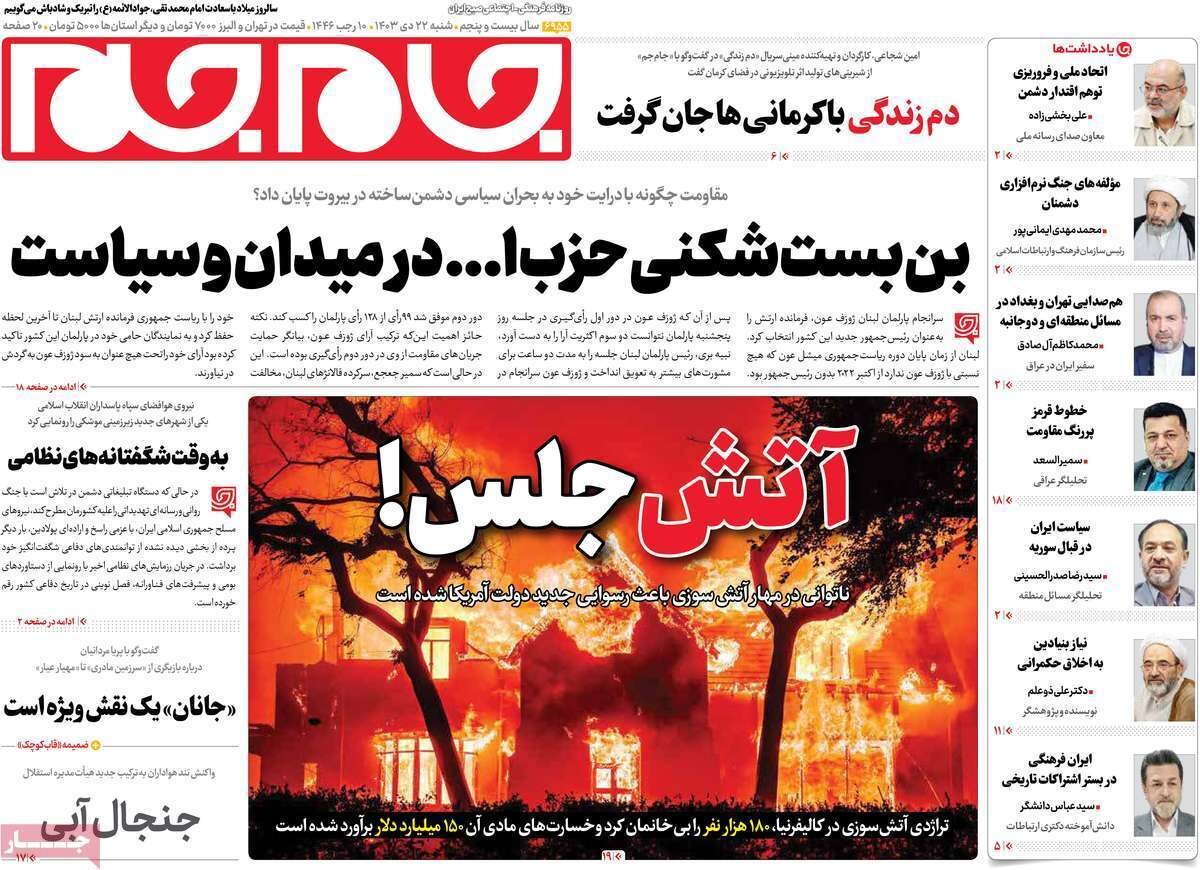TEHRAN PAPERS

TEHRAN - In a note, Jam-e-Jam emphasized the importance of preparing to counter America's psychological warfare against Iran.
The article argued that the most intense confrontation between Iran and the United States is not economic, political, or military but psychological. Consequently, all sectors of society must actively engage in this ongoing battle. The United States, the article claimed, is leveraging psychological operations to achieve its objectives, attempting to propagate the notion that development and progress are unattainable unless Iran reverts to its past relationship with America. The article stressed that the warning from the Leader of the Islamic Revolution on this matter is both insightful and urgent, urging vigilance against such tactics. It concluded that America’s ultimate goal is to dominate Iran, and any compliance with U.S. demands would contradict the interests and aspirations of the Iranian people. Capitulation to U.S. pressures, it warned, would fail to satisfy public expectations.
Ham Mihan: Negotiations must not delay people's lives
In an interview with Ham Mihan, Abdolreza Farajirad, a geopolitics professor, discussed the importance of addressing Iran’s membership in the Financial Action Task Force (FATF). He highlighted that joining FATF could provide a way for Iran's banking system to overcome restrictions related to money laundering and other financial hurdles. Farajirad noted that even if Iran reaches a nuclear agreement with the West, issues within the banking system and financial exchanges would persist as long as the country remains on the FATF blacklist. “Countries will not engage with us if we are blacklisted,” he explained. He argued that advancing negotiations with the West could improve prospects for resolving the FATF issue. Farajirad also criticized the politicization of FATF within Iran, where it has become entangled in foreign policy debates and domestic political rivalries. He warned that inaction on this front would harm relations with even friendly nations. "The lives of the people should not be delayed by negotiations," he concluded, stressing the need for pragmatic solutions.
Arman-e-Melli: Iraqi PM’s mediating role in Tehran
In a commentary, Arman-e-Melli analyzed Iraqi Prime Minister Mohammed Shia’ al-Sudani’s visit to Tehran, highlighting his growing influence as a key regional politician. The piece noted Iraq’s efforts to mediate the Iran-Saudi conflict and al-Sudani’s outreach to the new Syrian government as evidence of his emerging stature. Al-Sudani’s trip to Iran drew significant speculation, with many questioning whether he carried messages from the United States regarding Iran’s activities in Iraq, particularly concerning the Hashd al-Shaabi forces. The editorial suggested that Sudani likely sought to reconcile Iranian support for Iraqi Resistance groups with U.S. concerns, aiming to prevent friction with Washington while preserving the role of Hashd al-Shaabi in Iraq’s security landscape.
Siasat-e-Rooz: West’s plot to divide Iran will fail
Siasat-e-Rooz dedicated its editorial to exposing the West's false ambitions to divide Iran, arguing that such schemes will ultimately fail. The piece accused the United States and Israel of exploiting Turkey to further their agenda, noting that Ankara is unlikely to play a decisive role in Syria’s future. The West, the editorial stated, has used support for Kurdish groups in the region to implement its divisive policies, which will also have repercussions for Turkey. However, it asserted that Iran is well-equipped to counter such separatist agendas, thanks to the awareness and unity of its people and leadership. The piece criticized Turkey’s approach to regional issues, particularly its Pan-Turkism policies, which have sometimes worked against Iran’s interests, such as in the Armenia-Azerbaijan conflict and the proposed Zangezur Corridor. While emphasizing Iran’s past demonstrations of friendship to Turkey, the editorial called for Ankara to clarify its position and warned that trust in Turkey’s current policies is diminishing. The editorial concluded with a firm statement: “The policy of separatism will not succeed in Iran. Both the people and the government are resolute in resisting such attempts.”

No comments:
Post a Comment